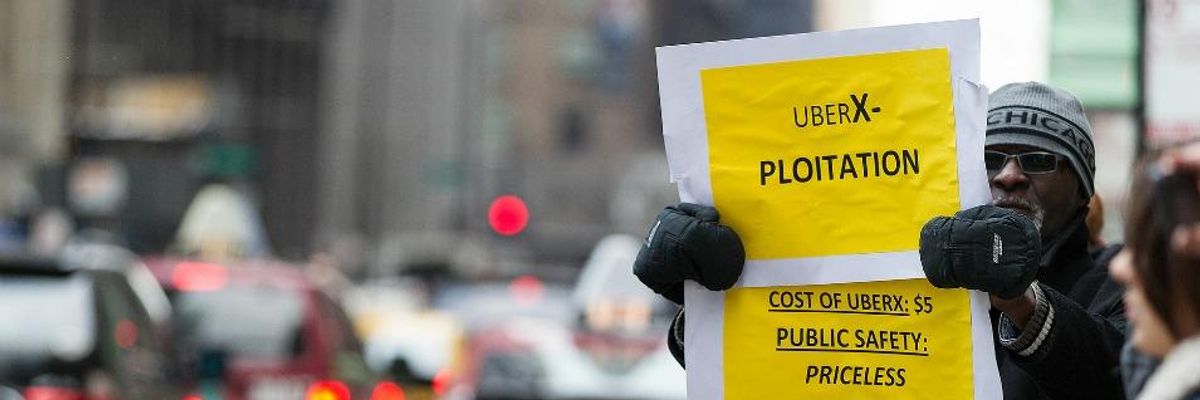
Chicago taxi drivers outside City Hall and circling the neighboring streets protest the granting of a city license to ride-sharing company Uber. Cab drivers say the company has an unfair advantage because they aren't subject to the same stringent regulations. (Photo: Scott L/flickr/cc)
Uber Wants to Reorganize the Economy? Workers, Too, Can Play at that Game
The global newswire Associated Press announced this January that it will no longer refer to the app-based cab-hail service Uber as "ride-sharing."
The move follows criticism that services like Uber and Lyft are very far from sharing; to the contrary, they are taking more than they're giving.
The global newswire Associated Press announced this January that it will no longer refer to the app-based cab-hail service Uber as "ride-sharing."
The move follows criticism that services like Uber and Lyft are very far from sharing; to the contrary, they are taking more than they're giving.
That's certainly the view of Bhairavi Desai co-founder and director of the National Taxi Worker's Alliance. Desai told GRITtv this week that while it characterizes itself as an innovative disruption, Uber's more like Walmart on wheels. They're not democratizing the workplace, she said, they're de-regulating it or rather, re-regulating it, to the benefit of app-owning bosses and the detriment of drivers.
Minimum guaranteed wages, health and safety insurance, and the chance to negotiate collectively: taxi drivers fought decades for those minimal protections, said Desai. Now in comes Uber and behind the sharing spin, what's it really want? She says, "It's nothing less than the reorganization of the economy."
The worker contributes the car, the gas, the training and the risk, and in return for being called an "independent contractor" they make more or less the same money as they would working for a fleet. They make pick up more rides, more quickly, and drive more hours, but that should raise real safety concerns. Doug Henwood reporting for The Nation found taxi drivers in Chicago and Los Angeles making around $12 hour after expenses - about the same as other drivers.
Former driver Jon Liss writes that "for all the convenience Uber may offer its users, one of its primary byproducts has been the degradation of working class jobs that once generated a living wage."
Nor, as Liss points out, does Uber have any responsibility to serve everyone, only the smartphone clutching, credit-card swiping few, even as prices soar and taxi supply shrinks for the rest of us.
That said, the status quo wasn't perfect for taxi drivers pre-Uber, any more than it was for part-timers pre Wal-Mart. The bosses' pitch - that workers can be partners, sharers, associates (the euphemisms mount) works not only because people are desperate, but also because being a worker's never brought with it the economic power or cultural pride in race-to-the-top America that it has in countries where unions have been less devastated.
But Uber et al better watch out. Today, the Taxi Workers are at work on their own app. And as we report in our latest documentary, Own the Change, hundreds of taxi drivers are becoming worker-owners by creating their own worker-owned companies - like Madison's Union Cab, a co-operative. Reorganize the economy? Two can play at that game.
As Desai says, "I love a good disruption but I love it in favor or poor people and working people."
An Urgent Message From Our Co-Founder
Dear Common Dreams reader, The U.S. is on a fast track to authoritarianism like nothing I've ever seen. Meanwhile, corporate news outlets are utterly capitulating to Trump, twisting their coverage to avoid drawing his ire while lining up to stuff cash in his pockets. That's why I believe that Common Dreams is doing the best and most consequential reporting that we've ever done. Our small but mighty team is a progressive reporting powerhouse, covering the news every day that the corporate media never will. Our mission has always been simple: To inform. To inspire. And to ignite change for the common good. Now here's the key piece that I want all our readers to understand: None of this would be possible without your financial support. That's not just some fundraising cliche. It's the absolute and literal truth. We don't accept corporate advertising and never will. We don't have a paywall because we don't think people should be blocked from critical news based on their ability to pay. Everything we do is funded by the donations of readers like you. The final deadline for our crucial Summer Campaign fundraising drive is just days away, and we’re falling short of our must-hit goal. Will you donate now to help power the nonprofit, independent reporting of Common Dreams? Thank you for being a vital member of our community. Together, we can keep independent journalism alive when it’s needed most. - Craig Brown, Co-founder |
The global newswire Associated Press announced this January that it will no longer refer to the app-based cab-hail service Uber as "ride-sharing."
The move follows criticism that services like Uber and Lyft are very far from sharing; to the contrary, they are taking more than they're giving.
That's certainly the view of Bhairavi Desai co-founder and director of the National Taxi Worker's Alliance. Desai told GRITtv this week that while it characterizes itself as an innovative disruption, Uber's more like Walmart on wheels. They're not democratizing the workplace, she said, they're de-regulating it or rather, re-regulating it, to the benefit of app-owning bosses and the detriment of drivers.
Minimum guaranteed wages, health and safety insurance, and the chance to negotiate collectively: taxi drivers fought decades for those minimal protections, said Desai. Now in comes Uber and behind the sharing spin, what's it really want? She says, "It's nothing less than the reorganization of the economy."
The worker contributes the car, the gas, the training and the risk, and in return for being called an "independent contractor" they make more or less the same money as they would working for a fleet. They make pick up more rides, more quickly, and drive more hours, but that should raise real safety concerns. Doug Henwood reporting for The Nation found taxi drivers in Chicago and Los Angeles making around $12 hour after expenses - about the same as other drivers.
Former driver Jon Liss writes that "for all the convenience Uber may offer its users, one of its primary byproducts has been the degradation of working class jobs that once generated a living wage."
Nor, as Liss points out, does Uber have any responsibility to serve everyone, only the smartphone clutching, credit-card swiping few, even as prices soar and taxi supply shrinks for the rest of us.
That said, the status quo wasn't perfect for taxi drivers pre-Uber, any more than it was for part-timers pre Wal-Mart. The bosses' pitch - that workers can be partners, sharers, associates (the euphemisms mount) works not only because people are desperate, but also because being a worker's never brought with it the economic power or cultural pride in race-to-the-top America that it has in countries where unions have been less devastated.
But Uber et al better watch out. Today, the Taxi Workers are at work on their own app. And as we report in our latest documentary, Own the Change, hundreds of taxi drivers are becoming worker-owners by creating their own worker-owned companies - like Madison's Union Cab, a co-operative. Reorganize the economy? Two can play at that game.
As Desai says, "I love a good disruption but I love it in favor or poor people and working people."
The global newswire Associated Press announced this January that it will no longer refer to the app-based cab-hail service Uber as "ride-sharing."
The move follows criticism that services like Uber and Lyft are very far from sharing; to the contrary, they are taking more than they're giving.
That's certainly the view of Bhairavi Desai co-founder and director of the National Taxi Worker's Alliance. Desai told GRITtv this week that while it characterizes itself as an innovative disruption, Uber's more like Walmart on wheels. They're not democratizing the workplace, she said, they're de-regulating it or rather, re-regulating it, to the benefit of app-owning bosses and the detriment of drivers.
Minimum guaranteed wages, health and safety insurance, and the chance to negotiate collectively: taxi drivers fought decades for those minimal protections, said Desai. Now in comes Uber and behind the sharing spin, what's it really want? She says, "It's nothing less than the reorganization of the economy."
The worker contributes the car, the gas, the training and the risk, and in return for being called an "independent contractor" they make more or less the same money as they would working for a fleet. They make pick up more rides, more quickly, and drive more hours, but that should raise real safety concerns. Doug Henwood reporting for The Nation found taxi drivers in Chicago and Los Angeles making around $12 hour after expenses - about the same as other drivers.
Former driver Jon Liss writes that "for all the convenience Uber may offer its users, one of its primary byproducts has been the degradation of working class jobs that once generated a living wage."
Nor, as Liss points out, does Uber have any responsibility to serve everyone, only the smartphone clutching, credit-card swiping few, even as prices soar and taxi supply shrinks for the rest of us.
That said, the status quo wasn't perfect for taxi drivers pre-Uber, any more than it was for part-timers pre Wal-Mart. The bosses' pitch - that workers can be partners, sharers, associates (the euphemisms mount) works not only because people are desperate, but also because being a worker's never brought with it the economic power or cultural pride in race-to-the-top America that it has in countries where unions have been less devastated.
But Uber et al better watch out. Today, the Taxi Workers are at work on their own app. And as we report in our latest documentary, Own the Change, hundreds of taxi drivers are becoming worker-owners by creating their own worker-owned companies - like Madison's Union Cab, a co-operative. Reorganize the economy? Two can play at that game.
As Desai says, "I love a good disruption but I love it in favor or poor people and working people."

